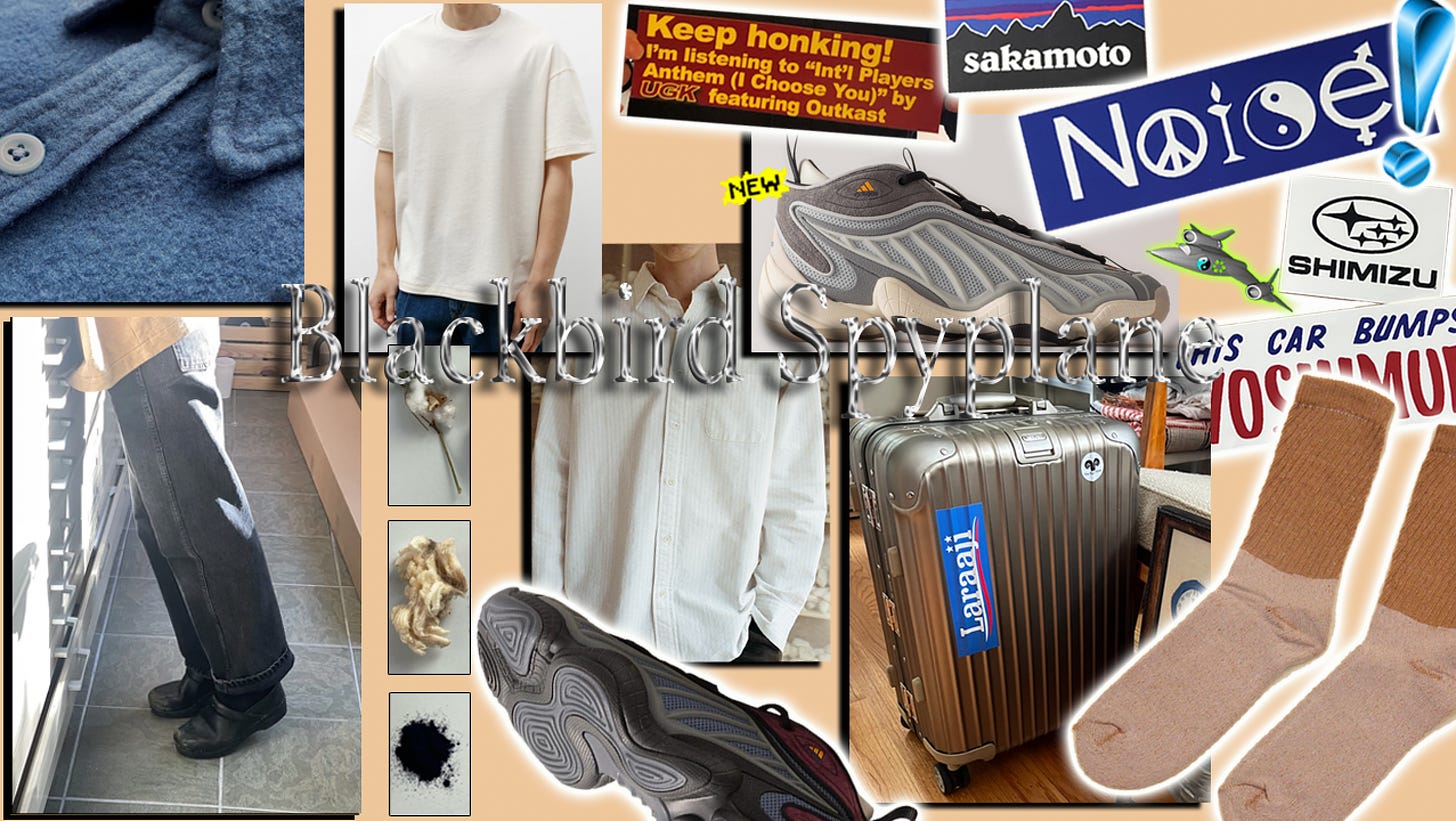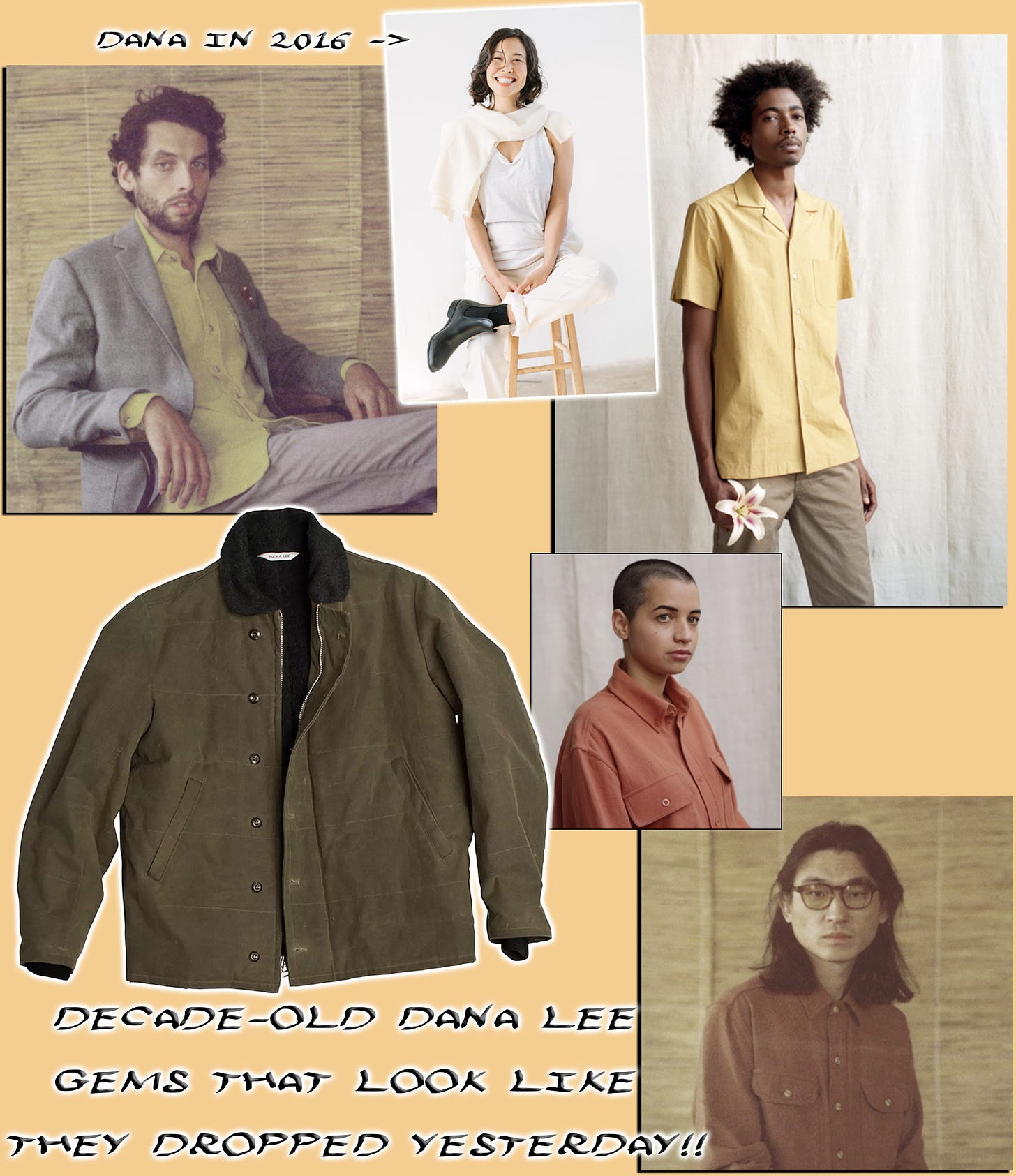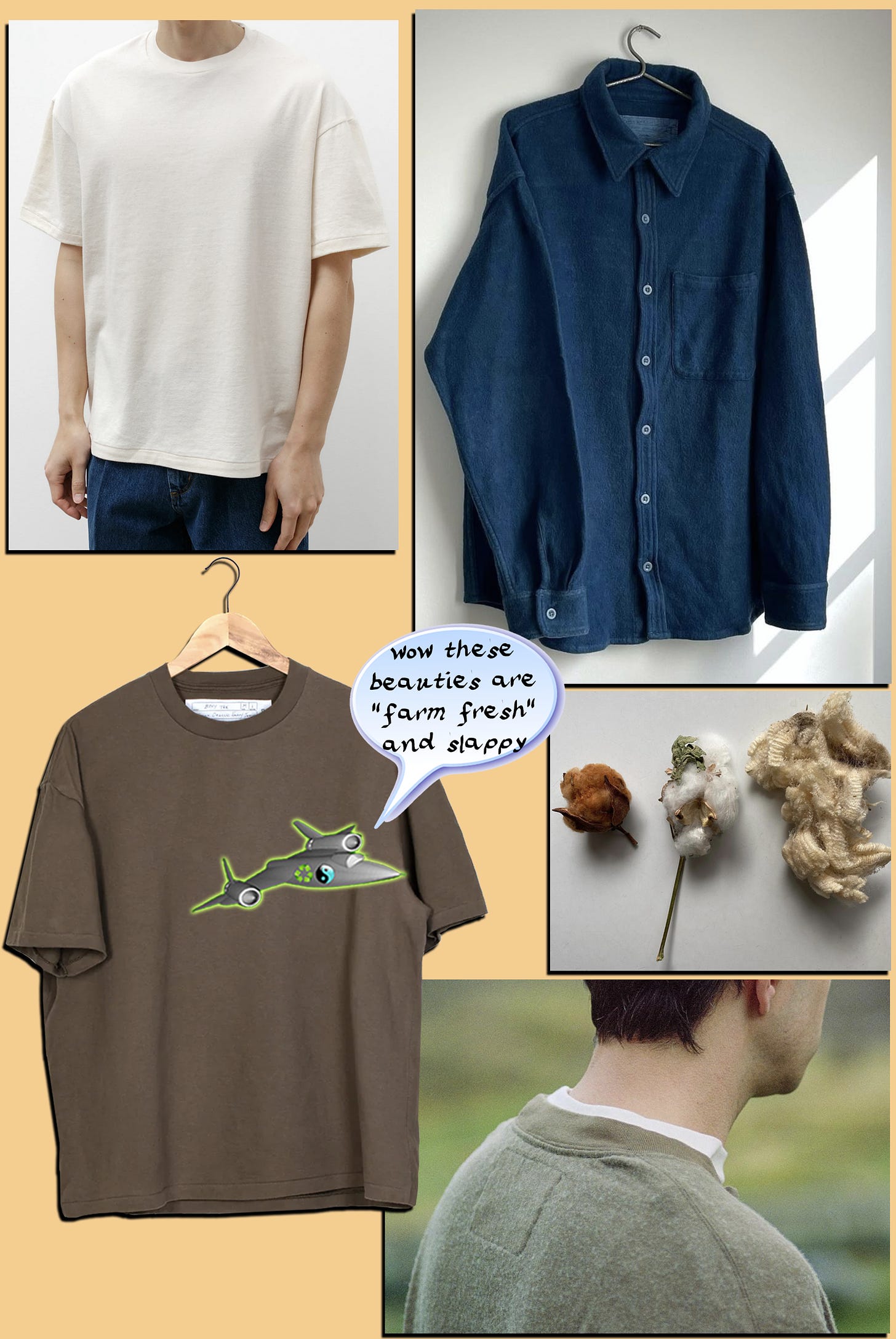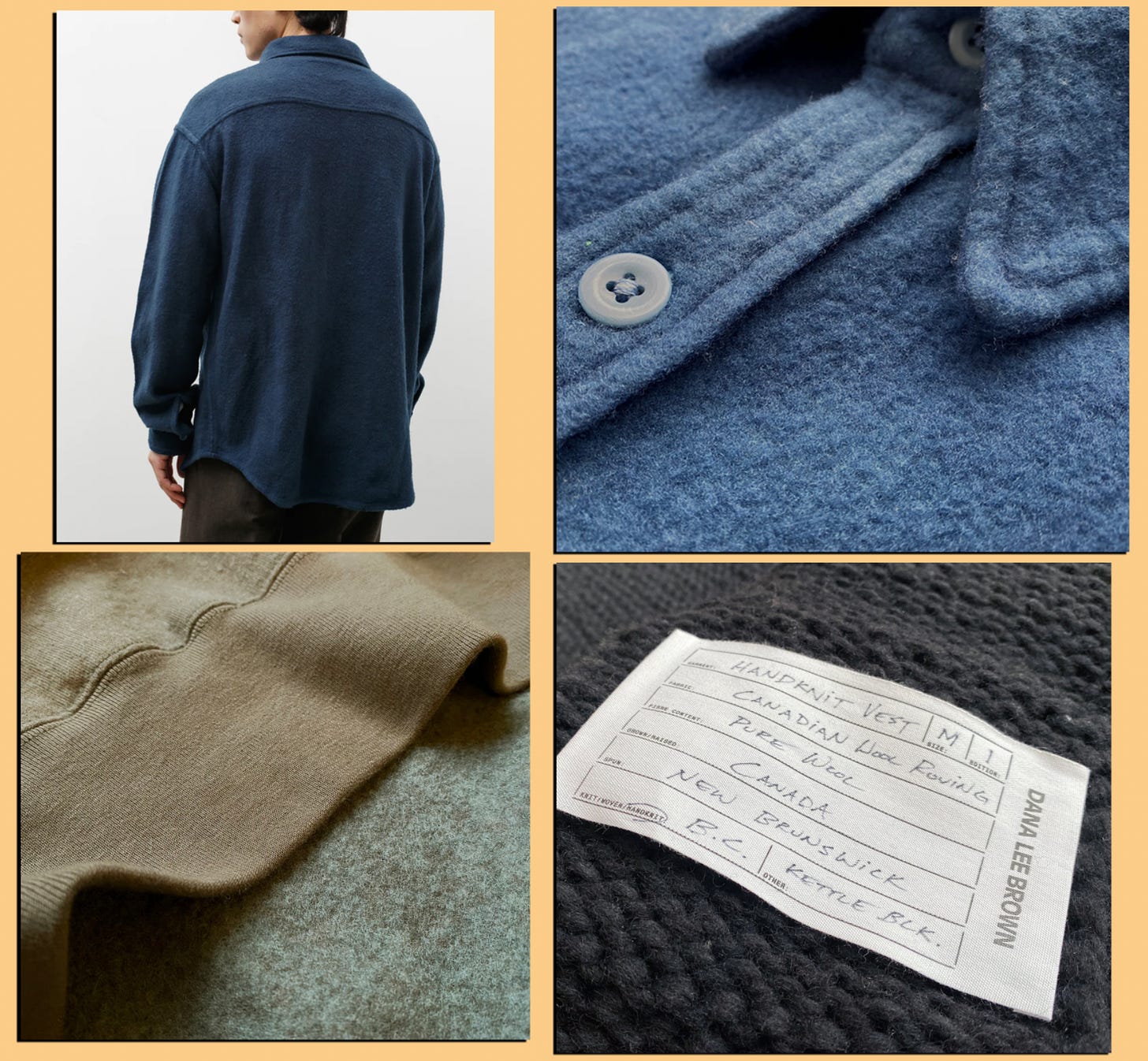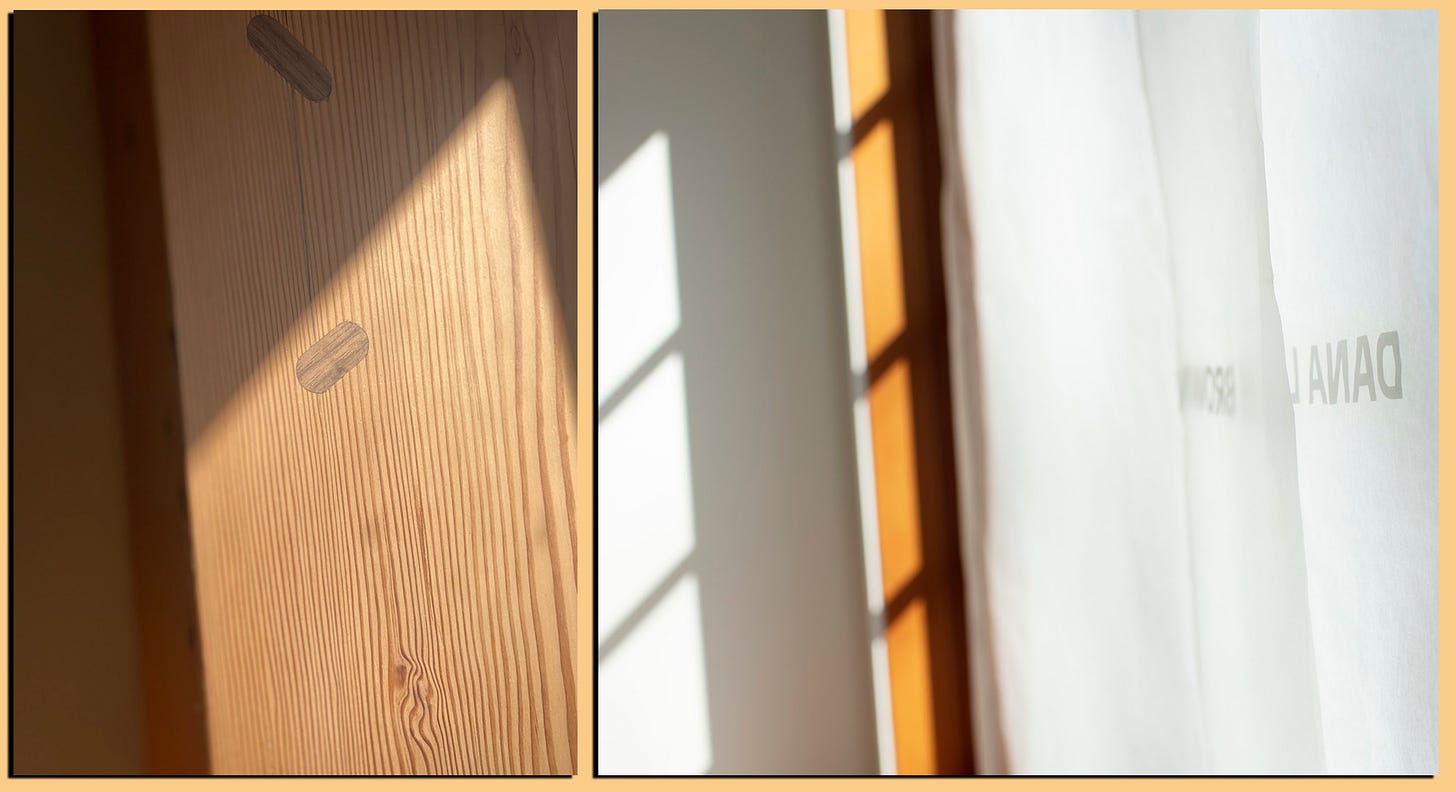Farm Fresh Fits
Dana Lee's quiet clothes, the coolest Adidas collab in a minute, organic socks for the low, and more unbeatable recon
Welcome to Blackbird Spyplane—
In today’s sletter we’ve got:
the coolest Adidas collab we’ve seen in ages, which arrives in a limited edition tomorrow morning
vibey bootleg stickers where ambient chunes and GORPY logos unite
slappy new striped tees & button-ups available later today
beautiful U.S.-made organic-cotton SOCKS that Erin and I both own, which come in 3-packs for the nice price
BUT FIRST —
Dana Lee is great at making clothes that speak with QUIET POWER. Back in the late 2000s she launched her eponymous NYC-based line of pared-down pieces… Mach 3+ shops like Opening Ceremony picked them up… and Dana soon secured her spot in the “cool menswear pantheon” of the era. If you walked into a sick store back then that carried, say, Band of Outsiders (now defunct), Patrik Ervell (now defunct), Engineered Garments (still goated, g-d bless), and Common Projects (once tight, now kinda cursed), odds were good you’d find Dana’s clothes in the mix, too, tweaking and paying homage to classic Americana staples in her own assuredly understated way.
It’s a testament to her eye that a bunch of those pieces look like they could have dropped yesterday…
Around 2015 she stepped away from the line to link & build with her 2 lil kiddos. She thought she’d be out of the game for a year, but ~7 went by, during which — contemplating the GLUT of jawns out there — she considered never making clothes again. “The market was flooded with product, and adding more of what felt like the same thing to the mix just wasn’t feeling right,” she told me the other day.
But she struck on a way — a very hard way !! — to get herself excited about clothes again, and as of late last year, Dana’s back with a muted new label called Dana Lee Brown. She designs everything out of her workshop on rural Bowen Island, British Columbia, where she moved from L.A.
The trick is that this time she’s trying to do something extremely tough: Make clothes where every last component — from the cottons to the wools to the dyes — is (regeneratively) grown, farmed, milled, spun, woven, cut, sewn, and so on, in North America.
The vibe is necessarily “small” and “slow”: Right now she makes a phenomenal boxy tee, a killer sweatshirt, a fleecey button-up, a handknit vest — and nothing else. Cut from organic cottons and Rambouillet wools, these are clothes with DEPTH and RADIANCE. Some new pieces are in the works but they’ll drop whenever they drop because Dana is operating on a blessed, unpredictable combination of “Gaia Time” and “Island Time” baby.
How do you shrink the gap between CLOTHES and the SOIL? Can you make jawns ethically “at scale” in a global economic system beset by profound evil? What does “menswear” even mean at this point? We dropped Dana a line to find out…
Blackbird Spyplane: A lot of my and Erin’s favorite designers are women who started out making “clothes for men” — Margaret Howell, Grace Wales Bonner, Emily Bode, Martine Rose, and Rachel Comey, just off the top of my head. Obviously there are women, including you, who wear your designs, too. What about the idiom of menswear appeals to you?
Dana Lee: “The appreciation for the small stuff, the fact that there’s less need for variety, the interest in more-utilitarian fabrics, the interest in process & quality — though it seems womenswear has been heading more in that direction, too? It’s less of a gender thing, overall, and more that these were the types of clothes I was interested in, and back in the day, ‘men’s’ provided more of a community for that. I’ve always wanted to expand more into women’s, and I still hope to, but it’s a lot to take on.”
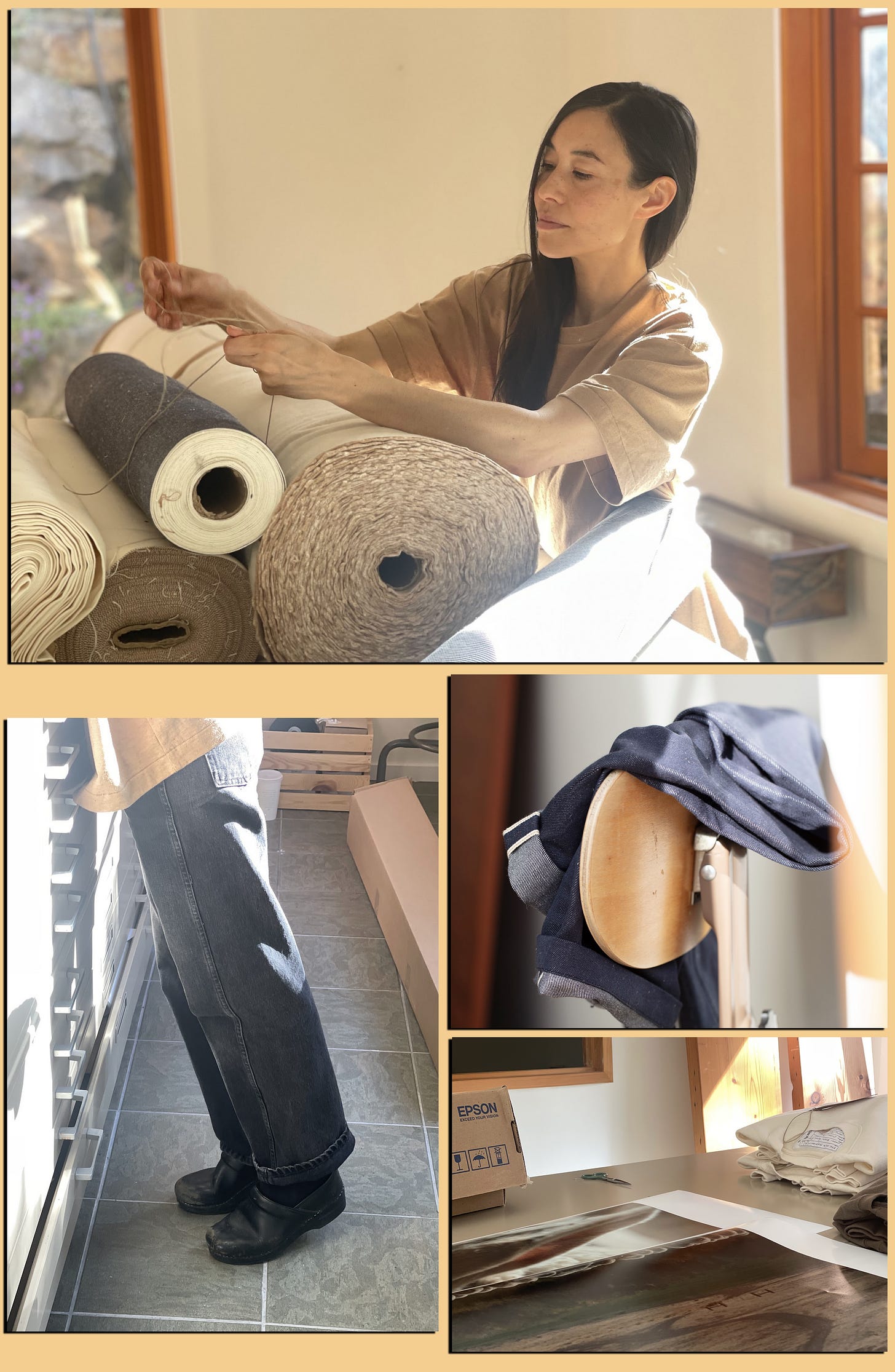
Blackbird Spyplane: The materials you’re using all have their origins in the U.S. and Canada. What’s important to you about sourcing that way, and is it easier or more difficult than it seems? It seems difficult as h*ll!
Dana Lee: “It’s extremely difficult. It’s common for clothes to be locally cut & sewn, with fabrics sometimes being locally milled, but the actual fibers are almost always imported: farmed, processed, spun, plied and dyed in other locations. North America used to be bustling with that infrastructure, but we’ve lost most of it over the last several decades.
“But the challenge of working within those parameters felt really creative to me, compared to just walking into a showroom and selecting from hundreds of ready-made fabrics. And the choice of working with local supply chains is more of an exercise in working with what’s around us — similar to a farm-to-table approach — than suggesting some sort of North American superiority.”
Blackbird Spyplane: Right — offshoring production is full of murky practices, but even “Made in the USA” can mean some gnarly s**t. Like, it’s very cool that there are still specialty mills in North Carolina, but you gotta wonder about the degree to which the state’s textile industry is sustained by the anti-labor right-to-work laws there. There are all these contradictions involved in trying to make things conscientiously at anything approaching scale…
Dana Lee: “Yes, totally. And this project is based on local supply chains, but I’m in full support of any off-shore production that elevates humans and their surroundings. I also think it’s possible to get beautiful, high-quality products made offshore if people are willing to pay for them. It bothers me when other countries, and their people, are demonized or held responsible for bad practices or low-quality products, when it’s largely a result of western price demands and colonial history. That type of framing is often politically motivated, and fuels dangerous racist stereotypes.
“At the end of the day, I think it’s important to know as much as possible about what truly goes into a piece of clothing, so we can make more informed choices, and value the miracle of each garment more. When you think of all the human connection, skill, challenges, steps and resources that go into a natural-fiber garment, it’s hard to think about throwing something away.
“Also, about North Carolina: It sounds crazy, but in the spinning world, organic cotton is actually considered a contaminant. The fibers dye differently than non-organic cotton fibers, so the mills have to painstakingly clean everything between lots. The result is that there are only two small mills in the U.S. willing to spin organic cotton anymore, both in North Carolina. Without those mills, the whole local organic-cotton industry — which positively impacts land & worker health across many states — could collapse.”
Blackbird Spyplane: What’s on the horizon for your line?
Dana Lee: “A collection of custom fabrics I’ve been working on — some for as long as 20 months now — is finally coming to fruition. Before fall there’s going to be a range of vintage-loomed organic selvedge denim and naturally brown cotton wovens and jerseys. And I can’t and don’t want to replicate all my former styles, but there will be some familiar styles coming out in newer fits. I wish I could give more specific drop times but I’m at the mercy of a much slower process than usual, with development literally starting from the soil for most things.”
🪴 The Dana Lee Brown site & webshop is here, her IG is here, and the Spyfriends at Neighbour carry her pieces here, too.
AND this weekend she’s soft-launching “a small flagship store” on Bowen: “If you can make it — and I highly recommend it! — you can come see and feel the raw natural fibers behind each garment,” she says, “along with tactile chronicles of each fabric’s process.”
MEANWHILE — let’s get into a new “Spyplane Slapper Swarm”:



